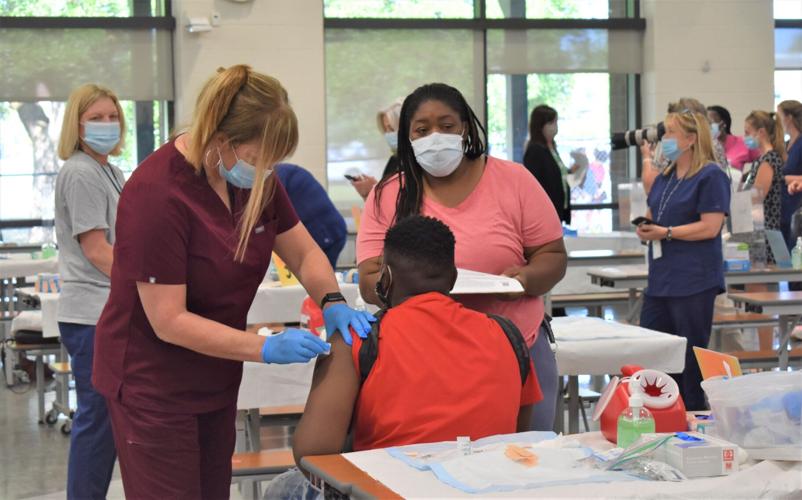
A nurse prepares to give the Pfizer vaccine to a student at the vaccination clinic at Laing Middle School on May 25.
Last month’s surge in COVID-19 cases showed that children are vulnerable to the virus.
August and September marked the highest two-month period of hospitalizations due to COVID-19 at MUSC Shawn Jenkins Children’s Hospital since the start of the pandemic. The 74 children admitted in the last two months made up 40 percent of all COVID-19 related admissions at the children’s hospital.
“We’ve not only seen a surge of the acuity, or the severity of illness, but also in the volume of kids needing hospitalization,” said Dr. Elizabeth Mack, the chief of pediatric critical care at MUSC. “We need to continue to be vigilant and protect our children, especially those who are not yet eligible for vaccination.”
Children ages 12 and older are eligible for the Pfizer vaccine, which was approved by the U.S. Food and Drug Administration for ages 16 and older; the vaccine is available through emergency use authorization (EUA) for children ages 12 to 15.
Even with vaccine availability, only 25 percent of children ages 12 to 19 have received the shot in South Carolina.
Throughout the pandemic, MUSC has had zero cases of children who were fully vaccinated admitted to the hospital for COVID-19.
Dr. Allison Eckard, the division chief for pediatric infectious diseases at MUSC, recommends vaccinations as the top mitigation strategy against the virus, along with wearing masks and social distancing.
Mack said those who are eligible for the vaccine need to form a cocoon of protection around those who are too young to get the shot.
This fall’s surge of the delta variant, which is up to eight times more contagious, said Eckard, resulted in more severe COVID-19 cases in children than the hospital saw with other surges. Four children were on extracorporeal membrane oxygenation, (ECMO), which is an invasive therapy that uses a machine to oxygenate the blood so the lungs don’t have to do the work. The goal of the therapy is to give the lungs a chance to heal; however, it is not a cure. The hospital did not treat any children with ECMO until the end of this summer.

The Pfizer vaccine being prepared at the vaccination clinic at Wando High School on April 29.
“We have had to use ventilators in 11 children in the last two months and many of those children had no underlying conditions,” said Eckard.
Eckard said it’s a misconception that children without underlying conditions are not at risk for severe COVID-19. She added that many underlying conditions are common in children, such as diabetes, asthma and obesity. Nearly one-third of children in South Carolina are overweight or obese and 12 percent of children have asthma, said Eckard.
“As somebody who works in the pediatric ICU who talks to families who are losing their children, this is not about rates and percentages, this is about our future and people’s lives are devastated by something that is preventable,” said Mack.
Eckard said the goal has always been prevention because even though most children recover from the virus, no one can predict how an individual child will react to COVID-19.
The hospital is seeing children who had COVID-19 months ago still experience heart inflammation, chronic fatigue or other complications from the virus.
A serious complication, multisystem inflammatory syndrome, known as MIS-C, remains a concern for children who have recovered from the virus. MIS-C occurs after the immune system is overworked, and can cause inflammation in the heart, lungs, kidneys or other organs. It can result in a brief hospital stay, but more severe cases require ICU care or ECMO treatment.
While the most severe cases end up in the hospital, the delta variant has been spreading rapidly among children. South Carolina is ranked second in cumulative COVID-19 cases per 100,000 children, according to data from the American Academy of Pediatrics on Sept. 30.
Eckard works closely with Charleston County School District to review data. From the first day of school on Aug. 18 until the end of September, the total number of COVID-19 cases across the district was 2,300, which is 83 percent of the total for the entire previous school year.
“That is an incredibly disheartening number to hear because we did very well last year keeping kids in school … We are seeing an unprecedented number of classroom and school closures this year because of the combination of delta, not masking and not being able to physically distance as much,” said Eckard.
Eckard said the goal is to keep the children in the classroom. “This really is the opportunity to get vaccinated for not only family members but also the children because that will help decrease the number of COVID cases but also the number of quarantines.”




